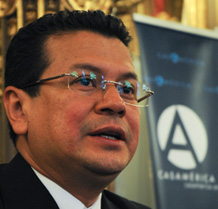More than 63,000 unaccompanied children from Central America have crossed the southern US border without authorization in just the last year. A spike in arrivals over the summer led to national outrage over their situation, prompting President Barack Obama to propose a $3.7 trillion supplemental appropriation request in early July. Four months later, this request still lingers in Congress.
While we await action from Capitol Hill, the Northern Triangle (El Salvador, Guatemala, and Honduras) countries are not idly sitting by. Instead, the migrant surge has sparked them to craft a regional plan to confront longstanding structural problems—much of the impetus behind the decisions of children and young adults to leave.
The need for greater economic opportunity, stronger institutions, higher quality education, more effective implementation of the rule of law, and greater transparency are core elements of what they have called the Plan of the Alliance for Prosperity in the Northern Triangle. It aims to proactively disincentive children—and other unauthorized immigrants—from embarking on the treacherous journey from their home countries through Mexico and to the United States. The plan would also help to keep critical human capital at home. In just the last few years, approximately nine percent of the population—some of the best and brightest—have emigrated north.
Presidents Juan Orlando Hernández of Honduras, Otto Pérez Molina of Guatemala, and Salvador Sánchez Cerén of El Salvador shared the plan with Vice President Joe Biden on the sidelines of the UN General Assembly in late September. On November 14, at the Inter-American Development Bank, they will publicly unveil this historic effort to come up with joint, regional solutions for challenges that historically had been addressed on a country-by-country basis. Previously, joint action—through efforts like the Central America Regional Security Initiative (CARSI)—had been developed by or pushed from Washington.
This new plan marks a significant turning point for the Northern Triangle. Most notably, it is a change in mindset: it represents a homegrown initiative to address the underlying causes of the migrant surge. While the particular reasons for the insecurity or lack of jobs in each country is different, the root issues must be tackled on a regional basis.
More foreign investors will be drawn to the Northern Triangle if they can make smart investments across all three countries. The maras (or gangs) and nacrotraffickers do not recognize borders; neither should a regional plan for economic development.
The political timing of their visit is no coincidence. President Obama repeatedly has stated that he will take long-awaited executive actions to improve the immigration system before the end of the year. The new Republican leadership in Congress has warned him against taking unilateral actions, but the end result is that— even after passage of the Senate’s bipartisan immigration reform bill more than a year ago —immigration is once again a hot topic in Washington.
The visit of the three Central American presidents could be the likely precursor to President Obama’s expected announcement. For the foreign leaders, this is the perfect moment to ride the wave of immigration attention and generate interest, and possibly financing, in their effort to reduce the immigrant “push.” For the Obama administration, the unveiling of the Central Americans’ plan is a good talking point of why deportation relief must be provided now to millions of unauthorized immigrants.
This week’s presidential visits marks a new page for Central America, and hopefully represents the beginning of a new partnership with the United States, the international financial institutions, and the broader global community. Guatemala, Honduras, and El Salvador are laying out a roadmap for prosperity. As partners, we must help them succeed.
Jason Marczak is Deputy Director of the Atlantic Council’s Adrienne Arsht Latin America Center.
